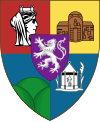Portal:European Union
Introduction
The European Union (EU) is a supranational political and economic union of 27 member states that are located primarily in Europe. The Union has a total area of 4,233,255 km2 (1,634,469 sq mi) and an estimated total population of over 449 million. The EU has often been described as a sui generis political entity combining the characteristics of both a federation and a confederation. Containing 5.8% of the world population in 2020, EU member states generated a nominal gross domestic product (GDP) of around US$16.6 trillion in 2022, constituting approximately one sixth of global nominal GDP. Additionally, all EU states except Bulgaria have a very high Human Development Index according to the United Nations Development Programme. Its cornerstone, the Customs Union, paved the way to establishing an internal single market based on standardised legal framework and legislation that applies in all member states in those matters, and only those matters, where the states have agreed to act as one. EU policies aim to ensure the free movement of people, goods, services and capital within the internal market; enact legislation in justice and home affairs; and maintain common policies on trade, agriculture, fisheries and regional development. Passport controls have been abolished for travel within the Schengen Area. The eurozone is a group composed of the 20 EU member states that have fully implemented the economic and monetary union and use the euro currency. Through the Common Foreign and Security Policy, the union has developed a role in external relations and defence. It maintains permanent diplomatic missions throughout the world and represents itself at the United Nations, the World Trade Organization, the G7 and the G20. Due to its global influence, the European Union has been described by some scholars as an emerging superpower. In 2012, the EU was awarded the Nobel Peace Prize. The United Kingdom became the only member state to leave the EU, in 2020; ten countries are aspiring or negotiating to join it. (Full article...) Selected article The European Parliament (Europarl or EP) is the directly elected parliamentary body of the European Union. Together with the Council of the European Union (the Council), it forms the bicameral legislative branch of the Union's institutions and has been described by some one of the most powerful legislatures in the world. The Parliament, together with the Council, form the highest legislative body within the Union. This is only within the competencies of the European Community being limited to specific policy areas, however Union law does override national law. The Parliament is composed of 785 MEPs (Member of the European Parliament) who serve the second largest democratic electorate in the world (after India) and the largest trans-national democratic electorate in the world (492 million). Selected picturePhotograph: Julian Herzog Christiansborg Palace is a building in the Danish capital, Copenhagen. It is the seat of the Danish Parliament, the Office of the Prime Minister, and the Supreme Court. The first castle on the site was Absalon's Castle, built in 1167 by the bishop Absalon and demolished in 1370, after King Valdemar was defeated by the Hanseatic League. By the end of the 14th century Copenhagen Castle was built on the site but that too was demolished in 1731. The first Christiansborg was then built, on the orders of King Christian VI, becoming the largest palace in northern Europe on its completion in 1745. It was destroyed in 1794 by fire, and replaced by the second Christiansborg. That too burned down in 1884, eventually being replaced by the current building, which was built between 1907 and 1928. The modern building is neo-Baroque in style, although the 19th-century neoclassical chapel and the original Baroque riding grounds remain, having survived the fires.
Did you know?...that France possesses the largest exclusive economic zone (EEZ) in the world? ...that Monaco, San Marino, and Vatican City all mint their own euro coins, with their own national symbols on the back? ...that Turkey's two most famous weightlifters, Naim Suleymanoglu and Halil Mutlu are only two of four weightlifters in the world to have won 3 gold medals in 3 olympics? Selected citySofia is the capital and largest city of the Republic of Bulgaria, with a population of 1,246,791, and some 1,377,761 in the metropolitan area, the Capital Municipality. It is located in western Bulgaria, at the foot of the mountain massif Vitosha, and is the administrative, cultural, and economic centre of the country. The history of Sofia dates back to the 8th century B.C, when Thracians established a settlement there. Sofia has had several names in the different periods of its existence, and remnants of the city's millenary history can still be seen today alongside modern landmarks. Sofia is one of the oldest capital cities in Europe, blending its past and present in a remarkable architectural style. Historic landmarks include the 10th-century Boyana Church, the Alexander Nevski Cathedral, and the early Byzantine Saint Sofia Church. More modern architecture is represented by the Bulgarian National Opera and Ballet, the Ivan Vazov National Theatre, the Rakovski Str theatre district, Slaveykov Square's outdoor book market, and the NDK. Sofia is the see of an Eastern Orthodox and of a Roman Catholic diocese. General imagesThe following are images from various European Union-related articles on Wikipedia.
TopicsFeatured contentFeatured articles
Featured lists
Featured contentGood articles
CategoriesRelated portalsAssociated WikimediaThe following Wikimedia Foundation sister projects provide more on this subject:
Discover Wikipedia using portals |
































































